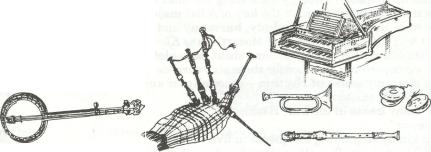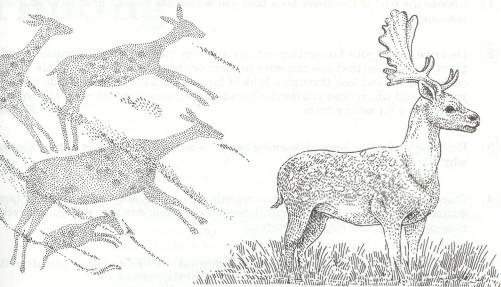
- •Contents
- •Introduction
- •Names
- •Family relationships
- •Marital status
- •Location
- •Build
- •From the neck up
- •From shoulder to fingertips
- •From the bottom down
- •Inside and outside the torso
- •The senses
- •Character and personality
- •Attitudes and beliefs
- •Moods
- •Expressing oneself
- •Reacting to events
- •Sounds people make
- •Actions and activities
- •The universe
- •Physical geography
- •The plant world
- •The animal world
- •Food and drink
- •Buildings and rooms
- •Furniture and household
- •Vehicles
- •Clothes
- •Size, quantity, dimensions and measurements
- •Shapes
- •Substances, materials and textures
- •Colours
- •The condition things are in
- •What things do
- •Noises things make
- •Births, marriages and deaths
- •Work
- •Health and illness
- •Sport and games
- •Entertainment
- •Games and hobbies
- •Music and the Arts
- •Cooking, eating and drinking
- •Travelling
- •Business, industry and agriculture
- •Law and order, crime and punishment
- •Quality
- •Time
- •Rise and fall
- •Probability, necessity and free will
- •Cause and effect
- •Index

Music and the Arts
Study
Arrange the instruments below so that they are in a more normal orchestral formation.
Practice 1
List the instruments in the orchestra that you would most like to play well. Also note down any that you would never like to learn and why.
Imagine that you are going to form your own supergroup, inviting famous pop stars and other musicians to join you. Choose the instrument that you would like to play from the list of instruments and types of singer below, in the line up for the recording session for this pop group or rock band. Then note down the instrument or vocals ofyour choice from each line and who you will invite to play them or to sing.
1lead vocals
2lead guitar (electric)
3acoustic guitar, 12-string guitar, sitar
4bass guitar, backing vocals
5drums
6extra percussion, tambourine, maracas, bongos
7keyboards, organ, electric piano, synthesiser
8mandolin, steel guitar, electric fiddle (violin)
9harmonica, mouth organ, Jew's harp, kazoo
10 saxophone, rhythm guitar, backing vocals
168

Music and the Arts
The arrangements, production, sound engineering and mixing are still to be organised. Think of the records that you have got at home. Choose a recording company or label that you would write to, in the hope that they will help you to find a studio and market your record.
Now you've got your latest single release recorded, when are you going to go out on the road and do some live concerts? Note down the five venues that you would choose for a European tour.
Game
Look at some more instruments on the right that we can strike, blow, shake, strum or pluck. Which of each pair below is the one in the picture?
1 banjo or ukelele?
2harpsichord or spinet?
3accordion or bagpipes?
4cornet or bugle?
5recorder or xylophone?
6castanets or tom-tom?
Now, a variation on a BBC radio game. You're being sent off to a desert island tomorrow with a toothbrush, bottle-opener and record-player. Make a list of the pieces of music that you are going to take with you. You're allowed some or all of the following:
2symphonies
2 concertos orsonatas
1 choral or orchestral work: oratorio, cantata, etc.
1 opera: (grand, light, comic or operetta)
1 additional piece or set ofclassical music: a rhapsody, overture, collection of nocturnes, serenades, studies, etc.
1jazzLP:(modernortraditional) 1 album: folk, soul or blues
1 LP by a group: (pop or rock)
1 solo album: male or female vocalist
1 other selection ofyour choice: brass band music, a film score, nursery rhymes, electronic music, pub sing-songs
[3J In this short quiz, answer each of the questions.
1 Which of these is not normally religious? |
|
||||
a a hymn |
b a psalm |
с a carol |
d a ballad |
||
2 |
Which of these would normally make the least noise? |
||||
a a round |
b a lullaby |
с an anthem |
d the refrain of a madrigal |
||
3 |
Which of these is the odd one out? |
|
|
||
a |
a duet |
b a triplet |
с a quartet |
d |
a quintet |
4Which order should these be in, starting from the top, that is to say the voice that can sing the highest notes?
a baritone |
b bass |
с tenor |
d contralto (alto) |
e |
soprano (treble) |
5 In what order, chronologically, did these names become popular? |
|||||
a a jukebox |
b a record deck |
с a phonograph |
d |
a gramophone |
|
e a record-player |
f a musical box |
|
|
||
169
Music and the Arts
Reading
Read through the text below and see how many of the musical terms contained in these reminiscences can be of use to you.
Try it again
I spent nearly six years studying and practising the piano at school; that's to say, four years playing scales and arpeggios, then eighteen months let loose on actual
pieces of music.
Myteacher, MrPearson, was the sort ofperson who thought that anyone who didn't have perfect pitch was educationally subnormal and as for pupils - like me - who had difficulty in reading music and never really began to master sight-reading, well, there was really no hope in life.
Looking back, I can see that he was not particularly modern or enlightened in his approach. There were weekly tests along the lines of:
'How many flats are there in the key ofA flat major? '
'How were Bach's ideas on melody, harmony and counterpoint significant?' 'What was the opus number of Mo/art's Eine Kleine Nachtmusik?'
and lots ofunanswerable questions about bass clefs and treble clefs, etc.
Still, we persevered together for those six years, despite my numerous handicaps. For a start, my sense of rhythm - especially for anything syncopated - was
virtually non-existent.
'How many beats in the bar, Haskins?' 'Three, sir.'
Then kindly stop trying to squeeze in five.'
Then, being so small, neither ofmy hands could span a full octave which meant that
keys were rarely struck by the finger recommended and that, particularly on the black notes, the little finger fell short of expectations.
'Is there normally а В flat in а В major chord, Haskins?' 'No,sir.'
'Right, then spare us it, will you?'
It wasn't that I didn't try. On the contrary, I had visions ofone day performing in
concerts and recitals, if not as a soloist, at least accompanying guest singers and instrumentalists. Somehow, the visions became fainter and fainter.
'I think if Beethoven had wanted a minor chord just there, Haskins, he would have written one. Don't you?'
So the years went on, endless variations on a single theme, dozens of arrangements of one basic tune, which I swear he composed himself.
I must admit there were times when I thought of changing instruments - going back to the woodwind class, where I had bitten through three oboe reeds in one session, or the strings department, where I kept dropping the viola bow, or the percussion wing, where I had snapped two drumsticks inside ten minutes, or the brass class, where I had nearly swallowed a trumpet mouthpiece. But I didn't. I stayed with Mr Pearson and his finger exercises, the wrong notes, the missed entrances, the 'Try it again's'. I suppose I was lucky that you can't play the piano
out of tune. I'm sure if it was possible to play flat, I would have done. 'What's the difference between an F sharp and an F natural, Haskins?'
'A semitone, sir.'
'Correct. Now, ifyou could remember that while you're playing, you might not make such a pig's ear out of one of the most beautiful melodies Brahms ever composed. Try it again.'
170

Music and the Arts
[2] Read this contents page from a new book on the visual arts.
ART FOR BEGINNERS
Part One |
|
An Introduction to Art through the Ages |
Chapter 1 |
|
Page 4 |
Early Beginnings StoneAgecavedrawings |
||
|
|
classical Greek sculpture |
|
|
Byzantine art |
|
|
Flemish tapestries |
Chapter2 |
|
Gothic architecture |
|
Page 36 |
|
The Golden Age the Renaissance period |
||
|
|
the Baroque age |
|
|
the Romantic era |
Chapter 3 |
|
the Neo-Classicists |
|
Page 81 |
|
Recent |
|
Impressionism |
Developments |
the Symbolists and Expressionism |
|
|
|
Cubism to pop art |
Part Two |
|
HowtobeanArtist |
Chapter 4 |
|
Page 123 |
Choosing a Style still life |
||
|
|
portrait painting |
|
|
landscapes |
|
|
abstract art |
Chapter 5 |
|
mosaics and murals |
|
Page 159 |
|
Choosing your |
sketchingandengraving |
|
Medium |
|
watercolours |
Chapter 6 |
|
oil-painting |
|
Page 180 |
|
Choosing |
|
form, colour and tone |
a Subject |
perspective |
|
|
|
balancing foreground with background |
Appendix |
One |
Art Galleries of the World |
|
|
where are the masterpieces? the most famous collections? |
|
|
the best exhibitions? |
Appendix |
Two |
Building a Collection |
|
|
originals and reproductions, restoring, framing, hanging |
171
MusicandtheArts
Practice
Choose the part of the above book that you would like to read first. Give your reasons.
Describe two ofyour favourite paintings and why you like them. If possible, find them in a book so that you can refer to them or show them to other people. Ifyou can't, then sit and look through a book of famous works of art and decide which ones you like and which ones you don't. Consider whether you would want all, any or some of them in your sitting room.
Describe your experience of learning to play a musical instrument or give the reasons why you never did so.
Discuss or write notes on the improvements in sound quality on records and tapes during your lifetime. Does the excellence ofproduction nowadays disguise a lack of musical quality, technique or interest?
Choose a song or piece of music and explain what you like and don't like about it. Then compare it with a similar piece of music of your choice.
Describe how you would arrange a popular folk song for recording with the singers and instruments of your choice.
Write a magazine review of a recently released record you have heard - classical or modern.
Write, in dialogue form, a minute of conversation during one of Haskins's typical lessons with Mr Pearson.
You have been asked to speak at a discussion evening on the subject of'Snobbery in Music'. Write the notes that will help you in your speech to express your opinions.
Add here any other words about music and the arts as you meet them.
172
